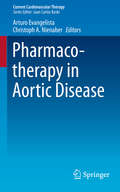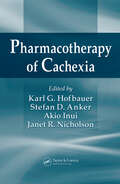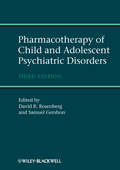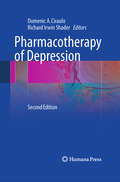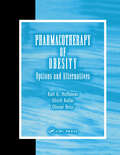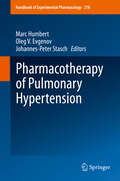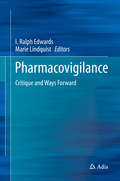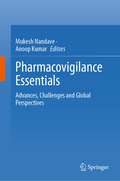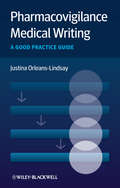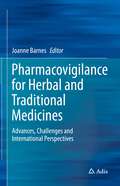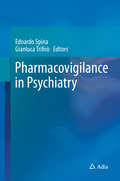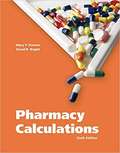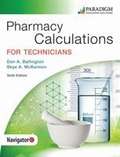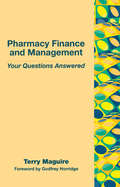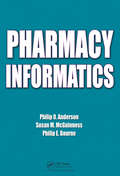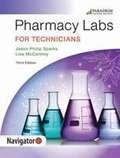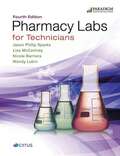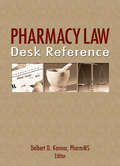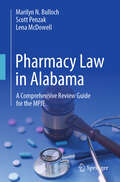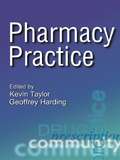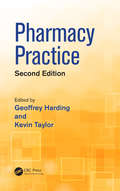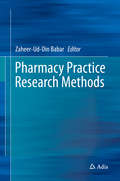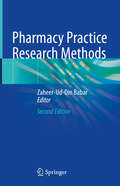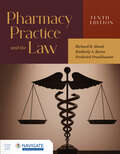- Table View
- List View
Pharmacotherapy in Aortic Disease
by Arturo Evangelista Christoph A. NienaberThis book is driven by the considerable progress made by novel imaging techniques in understanding the pathophysiology and evolution of aortic disease and its diagnosis. Despite the lack of symptoms in stable conditions, most aortic diseases have a high morbidity and mortality. New therapeutic strategies such as endovascular treatment and surgical techniques have appeared to improve conventional surgery in advanced phases of the disease, but until recently, medical treatment has focused on the control of cardiovascular risk factors using beta-blockers to reduce aortic wall stress by reducing blood pressure and heart rate. Pharmacotherapy in Aortic Disease updates the reader on the new medical treatment that are changing the natural history of these diseases. Leading experts have created a critical in-depth, yet concise, analysis of the available medical treatments for different aortic disease entities. Both basic research studies and clinical trials discussed in this book serve as a base for improving therapeutic management, delaying the need for surgery, and prolonging survival in these patients.
Pharmacotherapy of Cachexia
by Akio Inui Karl G. Hofbauer Stefan D. Anker Janet R. NicholsonAlthough a wealth of information can be found scattered throughout periodicals and research papers, tracking down the most effective treatment for a heterogeneous syndrome such as cachexia can be problematic. Edited by experts in the field, with contributions from a multidisciplinary panel, Pharmacotherapy of Cachexia is the first book devoted sole
Pharmacotherapy of Child and Adolescent Psychiatric Disorders
by David Rosenberg Samuel GershonThis book fulfils an urgent need for an updated text on pediatric psychopharmacology. It takes a unique approach in discussing recent findings within the context of current issues, including economic and political ones. The book covers the emerging question of treating children who do not yet meet diagnostic criteria for psychosis, e.g, schizophrenia or bipolar disorder, but who are deemed to be at high risk. This is an active area of debate: such children are being treated in certain centers, while others reject this completely. The book addresses the antidepressant controversy, the placebo response and unique strategies for delineating this, and ways to optimize the differential between active medication and placebo. It reviews the impact of recent American Heart Association guidelines for monitoring children on stimulants and other psychotropics. It adheres closely to DSM-IV diagnostic criteria throughout. The book describes the use of newly approved drugs such as Lexapro for treating adolescent depression and the novel compound Intuniv. It covers the TADS and CAMS studies, which evaluated the use of SSRIs alone and in combination with cognitive behavioral therapy for adolescent depression. Other topics include treatment of bipolar disorders, the increasing popularity of generic equivalents, combination pharmacotherapy and the potential dangers of psychotropic medications.Third edition of the first ever book published on pediatric psychopharmacology from renowned editors.Incorporates current developments with regard to SSRIs, their indications and their safety issues, including possible associated suicidal behavior.Addresses concerns about cardiovascular side effects of the new stimulant medications available, and compares to other FDA-approved medications for ADHD.Features many tables, figures and pictorials, making it highly accessible and reader friendly.
Pharmacotherapy of Depression
by Richard Irwin Shader Domenic A. CirauloComprehensive and state of the art, the second edition of Pharmacotherapy of Depression offers major revisions of every chapter and the addition of new chapters by expert contributors. The first chapter reviews the neurobiology of depression, which lays the groundwork for understanding the mechanisms of action of antidepressants. In the next chapter, a review of the general principles guiding the diagnosis and medication treatment of unipolar depression is provided. The clinical pharmacology of antidepressants is reviewed in some detail, supplemented by tables that provide information on dosing, indications, and metabolism. Augmentation strategies are reviewed, including the use of non-traditional agents. The chapters that follow next address the use of antidepressants in special populations, such as the elderly and depressed individuals with psychosis, bipolar disorder, substance abuse, and post traumatic stress disorder. The complex issues involving the diagnosis and treatment of depression during pregnancy is thoroughly reviewed in Chapter 8 and provides a synthesis of the scientific literature in the area, one that is noted for contradictory and controversial findings, as well as guidelines for prescribing. The next chapter then provides an overview of the treatment of depression in the pediatric population, highlighting clinical concerns such as suicide risk. The book concludes with two chapters at the interface of medicine and psychiatry in the treatment of mood disorders: managing depression in primary care settings and depression associated with medical illnesses. The outstanding clinician-scientists who have contributed to this volume are all leaders in their fields and represent a broad spectrum of renowned institutions. A timely contribution to the literature, The Pharmacotherapy of Depression, Second Edition, offers busy clinicians from many disciplines a strong scientific foundation that seamlessly transitions into practical recommendations for clinical practice. The result is another gold-standard guide to the safe and effective use of the latest antidepressant medications.
Pharmacotherapy of Obesity: Options and Alternatives
by Ulrich Keller Karl G. Hofbauer Olivier BossPrimarily intended for physicians and health care professionals who are treating obese patients, this book explores current and future options for drug treatment of obesity puts them into perspective against available alternative treatments. Distinguished scientists and clinical investigators provide reviews of each individual topic, covering a wide range of subjects from pathophysiology of obesity to the benefits of weight loss. The core sections on pharmacotherapy deal with currently available drugs and drugs in pre-clinical development. These sections are complemented with sections on non-drug treatment and general therapeutic aspects. This design provides an integrated view of therapeutic approaches to the treatment of obesity and its associated syndromes.
Pharmacotherapy of Pulmonary Hypertension
by Marc Humbert Oleg V. Evgenov Johannes-Peter StaschThis volume focuses on current evidence-based pharmacological treatments of various forms of pulmonary hypertension and provides a comprehensive review of the latest developments in this area. The first part of the book covers the definition, classification, pathophysiology, pathology, biomarkers and animal models of the disease, thus laying the conceptual basis for what follows. The middle section provides an overview of the established therapies, such as calcium channel blockers, prostanoids, endothelin receptor antagonists, phosphodiesterase-5 inhibitors and inhaled nitric oxide. The last section explores novel pathways and emerging therapeutic approaches including soluble guanylate cyclase stimulators, Rho-kinase inhibitors, inhibitors of serotonin receptors and transporters, peptide growth factors, vasoactive peptides, modulators of redox equilibrium and cyclic nucleotide homeostasis, as well as immunosuppressive and anti-proliferative agents. Particular attention is given to the clinical applications of these experimental therapies, that are on the horizon. The book thus spans the continuum from basic science to clinical applications.
Pharmacotherapy of Pulmonary Hypertension (Handbook of Experimental Pharmacology #218)
by Marc Humbert, Oleg V. Evgenov and Johannes-Peter StaschThis volume focuses on current evidence-based pharmacological treatments of various forms of pulmonary hypertension and provides a comprehensive review of the latest developments in this area. The first part of the book covers the definition, classification, pathophysiology, pathology, biomarkers and animal models of the disease, thus laying the conceptual basis for what follows. The middle section provides an overview of the established therapies, such as calcium channel blockers, prostanoids, endothelin receptor antagonists, phosphodiesterase-5 inhibitors and inhaled nitric oxide. The last section explores novel pathways and emerging therapeutic approaches including soluble guanylate cyclase stimulators, Rho-kinase inhibitors, inhibitors of serotonin receptors and transporters, peptide growth factors, vasoactive peptides, modulators of redox equilibrium and cyclic nucleotide homeostasis, as well as immunosuppressive and anti-proliferative agents. Particular attention is given to the clinical applications of these experimental therapies, that are on the horizon. The book thus spans the continuum from basic science to clinical applications.
Pharmacovigilance
by I. Ralph Edwards Marie LindquistWritten by experienced authors, this book offers expert personal views on what the current problems in pharmacovigilance are and how they should be solved. This book stems from thoughts and ideas discussed in a series of meetings of the International Society of Pharmacovigilance (ISoP), where concerns were raised that the current pharmacovigilance system is not delivering optimally to improve therapeutics in clinical practice. Pharmacovigilance of the future must be an active and integral part of health care delivery, and focus more on science and practices that support health professionals and patients in day-to-day care situations. To achieve this, a dynamic and sustainable development of vigilance must take precedence over the current excessive preoccupations with data processing and regulations; all aspects of medicines use and their effects need to be considered; and all stakeholders must be involved and engaged in an open and constructive debate. The work is essential reading for anyone who has an interest in safer use of medicines. It is intended to be equally challenging and rewarding, and sets out to stimulate a continuous debate on how pharmacovigilance can better meet the needs of health professionals and patients to achieve the aim of wise therapeutic decision making.
Pharmacovigilance Essentials: Advances, Challenges and Global Perspectives
by Anoop Kumar Mukesh NandaveThe book explores the field of pharmacovigilance, its historical context, along with its critical role in ensuring the safety of medications across the world. From its foundational principles to cutting-edge advancements and future challenges, this book provides a thorough understanding of the field's intricacies. The book begins by establishing the fundamentals of pharmacovigilance, emphasizing its significance in monitoring, detecting, assessing, and preventing adverse drug reactions (ADRs) that occur during the use of medications. Delving into the history of pharmacovigilance and regulatory actions, the book traces the evolution of the field, highlighting significant milestones and the establishment of regulatory frameworks that govern medication safety. It explores the pivotal role of regulatory authorities in developing guidelines, regulations, and policies to safeguard public health. A significant aspect covered in the book is the processing of ADRs, providing insights into the steps involved in handling and evaluating ADR reports. The book also addresses specialized areas within pharmacovigilance, including vaccine safety surveillance, herbovigilance (monitoring the safety of herbal medicines), materiovigilance (monitoring the safety of medical devices), and hemovigilance (ensuring the safety of blood products). Additionally, the book explores the role of pharmacogenetics in pharmacovigilance, highlighting how genetic factors influence individual responses to medications and how this knowledge can be integrated into safety monitoring and risk assessment. This book also covers databases used in pharmacovigilance across the globe, aggregate reporting and pharmacovigilance systems in EU and non-EU countries, and the role of artificial intelligence.Finally, it emphasizes the need for continuous improvement, vigilance, and proactive measures to adapt to the changing healthcare landscape and address emerging safety concerns. The book serves as acomprehensive guide for healthcare professionals, researchers, regulators, and policymakers involved in pharmacovigilance.
Pharmacovigilance Medical Writing
by Justina Orleans-LindsayPharmacovigilance Medical Writing covers the preparation of pharmacovigilance documents for all stages of the drug development process (i.e. from clinical development through to applications for marketing authorisations to the post-marketing stage). For each document, the book presents a review of the regulatory framework that governs the content of the document, followed by practical guidance (e.g. scheduling, source data, department/functions involved in document preparation/review, appropriate timelines and planning activities), ending with a generic model document compliant with the current guidelines, which can be modified to meet specific company and product requirements.
Pharmacovigilance for Herbal and Traditional Medicines: Advances, Challenges and International Perspectives
by Joanne BarnesThis remarkable new book is the first text dedicated to the topic of pharmacovigilance for herbal and traditional medicines. Taking a truly global perspective, this volume draws together contributions from a diverse group of experts, writing on current knowledge and practices in pharmacovigilance for herbal and traditional medicines, and on advances and innovation in monitoring the safety of this unique and complex category of products and preparations. In part one, the book discusses the current status of pharmacovigilance for herbal and traditional medicines, including the importance of natural products chemistry to harms, and its relevance in considering how pharmacovigilance for these products could be undertaken. Several other chapters discuss methodological approaches and ongoing challenges in pharmacovigilance for herbal and traditional medicines, including issues relating to nomenclature, coding and classification, and the nuances involved in causality assessment. Part two of the book focusses on pharmacovigilance for herbal and traditional medicines around the world, with chapters from authors in several different countries representing diverse historical, ethnic, cultural, social and political contexts. These chapters provide deeper insights and perspectives into spontaneous reporting for herbal and traditional medicines in those countries, and in the context of the local use, practice and regulatory landscape for these products. Part two also provides an overview and new analysis of international case safety reports for herbal medicines held in VigiBase (the World Health Organization's global database of individual case safety reports, maintained by the Uppsala Monitoring Centre).This book is aimed at pharmacists, doctors, nurses and other health professionals, herbal-medicine practitioners and organisations, herbal medicine and pharmaceutical industry personnel, pharmacovigilance specialists, medicines’ regulators, health and social science researchers and academics, pharmacovigilance and health professional students, and students of herbal and traditional medicine, throughout the world. It is an extremely valuable resource for all individuals whose work touches the intersection between herbal medicines and pharmacovigilance, and it provides both an introduction to the topic and a deeper, comprehensive, contemporary account of the topic.
Pharmacovigilance in Psychiatry
by Edoardo Spina Gianluca TrifiròThe first authoritative textbook specifically addressing issues of the field, this book delivers a focused discussion on several themes in psychiatry while providing a sound background on pharmacovigilance. Internationally-recognised researchers, clinicians and pharmacovigilance experts contributed to this textbook, giving it the benefit of different perspectives and years of experience. Pharmacovigilance in psychiatry provides a thorough introduction to this field but goes on to explore advanced themes such as methodologies and resources used for pharmacovigilance in psychiatry, challenges as well as most recent developments to this field, making it suitable for under-graduates, graduate and post-doctoral students and persons working pharmacovigilance who seek to broaden their knowledge on this subject.
Pharmacy Calculations
by Mary F. Powers David R. BrightPharmacy Calculations, 6e, provides pharmacy technician students and professionals with the tools necessary to learn the types of calculations commonly encountered in community and institutional pharmacy. The content of Pharmacy Calculations, 6e, includes material covering the knowledge areas within the Pharmacy Technician Certification Exam (PTCE) and Exam for Certification of Pharmacy Technicians (ExCPT). This book is clearly written, accurate, and easy to understand. It can be used in a classroom setting or for independent study to develop a careful and systematic approach to pharmacy calculations and can be used as a study aid for the PTCE and ExCPT exams. It aligns with the Fifth Edition of the American Society of Health-System Pharmacists (ASHP) Model Curriculum for Pharmacy Technician Education and Training Programs and the 2020 content outline for the Pharmacy Technician Certification Examination (PTCE). Features: • Carefully worded explanations are direct, easy to understand, and mathematically accurate. • Clearly stated Learning Objectives highlight key concepts for each chapter. • Clearly defined Key Terms are provided. • Full-color photographs and illustrations support the concepts. • Rx boxes provide helpful hints and reminders. • Many examples throughout the text guide students through the calculations. • Adequate space is provided for students to work through problems. • A 40-question practice exam is provided with problems similar to those found on the national certification exams.
Pharmacy Calculations For Technicians (6th Revised Edition)
by Don A. Ballington Skye A. McKennonWith Pharmacy Calculations for Technicians, students learn the essential mathematics concepts and skills pharmacy technicians use on the job. Clear, complete examples and practice problems guide students in learning the skills required for calculating and preparing drug doses in both community and institutional pharmacy settings. Students are guided step-by-step through calculation methods, including ratio and proportion, dimensional analysis, and alligation.
Pharmacy Finance and Management: Your Questions Answered
by Dr Terry MaguireFirst Published in 2017. Routledge is an imprint of Taylor & Francis, an Informa company.
Pharmacy Informatics
by Philip E. Bourne Philip O. Anderson Susan M. McGuinnessApplies the Principles of Informatics to the Pharmacy ProfessionEmphasizes Evidence-Based Practice and Quality Improvement ApproachesLeading the way in the integration of information technology with healthcare, Pharmacy Informatics reflects some of the rapid changes that have developed in the pharmacy profession. Written by educators and profession
Pharmacy Labs For Technicians (Third Edition)
by Jason Philip Sparks Lisa McCartneySuitable for a stand-alone pharmacy lab course or for the lab portion of a pharmacy practice course, Pharmacy Labs for Technicians teaches students detailed lab procedures and skills using hands-on practice.
Pharmacy Labs for Technicians
by Jason Philip Sparks Lisa McCartney Nicole Barriera Wendy LubinPharmacy Labs for Technicians, Second Edition teaches students detailed lab procedures and skills using hands-on practice. Included are 34 labs that teach administrative and clinical procedures such as using pharmacy reference texts, filling prescriptions, compounding medications, and preparing sterile intravenous products.
Pharmacy Law Desk Reference
by Albert I Wertheimer Delbert KonnorYour primary source for information on the legal issues of pharmaceutical practice, care, and activityToday&’s pharmacist is faced with legal, ethical, and moral concerns in making the transition from traditional pharmacy practice to an expanded role in clinical pharmacy and patient drug management services. Pharmacy Law Desk Reference is a primer on the legal aspects of pharmaceutical practice, providing background on foundational legal concepts, and guidance on the Food, Drug, and Cosmetic Act (FDCA), the Controlled Substances Act (CSA), and the Federal Trade Commission. This unique book examines the major topics that impact pharmaceutical care, including professional liability insurance; the need for supportive personnel in pharmacy practice; patent law, trademarks, and copyrights; law and ethics; business law; HIPAA privacy in the pharmacy; electronic prescribing; and medication error reporting. Handy tables, figures, and exhibits make complex information easy to access and understand.The better pharmacists understand the regulatory and legislative framework that shapes their practice, the better they will be able to carry out their responsibilities to patients. Pharmacy Law Desk Reference offers a broad scope on established legal subjects, the current direction of the profession, and important contemporary topics that affect the clinical role of the practicing pharmacist. Each chapter is authored by a nationally recognized authority on one or more aspect of pharmacy law and many of the contributors are active in the American Society of Pharmacy Law. Topics addressed in Pharmacy Law Desk Reference include: telepharmacy collaborative drug therapy management trade secrets and trade secret protection anti-competitive practices the threat of civil and criminal liability the Health Insurance Portability and Accountability Act of 1996 (HIPAA) FDA inspections consumer protection laws credentialing pharmacy compounding accreditation employment contracts Medicaid and Medicare controlled substance registration and prescription orders forged prescription orders and many morePharmacy Law Desk Reference is a comprehensive resource on the professional, legal, and contemporary issues in pharmacy practice. It is a primary reference guidebook for pharmacy practitioners, leaders of state and national pharmacists associations, members of state boards of pharmacy, educators and students, and an essential addition to all pharmacy libraries.
Pharmacy Law in Alabama: A Comprehensive Review Guide for the MPJE
by Marilyn N. Bulloch Scott Penzak Lena McDowellIn most states, anyone wishing to obtain a license to practice pharmacy must take a state-specific test on pharmacy law called the Multistate Pharmacy Jurisprudence Examination (MPJE). This exam is a combination of Federal pharmacy law and state-specific laws. While some states have their laws, rules, and regulations in an easy to access area, there is no centralized area for all the content on the MPJE exam in Alabama. Furthermore, student pharmacists are typically only taught state-specific laws, rules, and regulations for the state in which their school resides. If a person graduates from a school in a different state, they must compile all the information for the MPJE themselves, which can be cumbersome and time consuming. This book seeks to bridge this gap by including all the information needed to prepare for the MPJE for the state of Alabama, authored by pharmacists who are actively practicing and teaching within the state.
Pharmacy Practice
by Kevin Taylor Geoffrey HardingToday's pharmaceutical services are patient-oriented rather than drug-oriented. This shift towards patient-centred care comes at a time when healthcare is delivered by an integrated team of health workers. Effective pharmacy practice requires an understanding of the social context within which pharmacy is practised, recognising the particular needs
Pharmacy Practice
by Kevin Taylor Geoffrey HardingThis book discusses the many factors impinging on daily practice and the place of pharmacy in the delivery of health care. It goes beyond simply practice and draws on a diverse range of disciplines, including sociology, social policy, psychology, anthropology, history and health economics, with each contributor bringing a unique perspective and insight into the practice. In this fully updated edition, the content and presentation have been thoroughly revised and new material added to reflect the many changes that have occurred, particularly in pharmacy and health policy and professional regulation and development.
Pharmacy Practice Research Methods
by Zaheer-Ud-Din BabarThis book presents a contemporary view of pharmacy practice research covering theories, methodologies, models and techniques that are applicable. It has thirteen chapters covering the range of quantitative, qualitative, action research and mixed methods as well as management theories underpinning change in pharmacy practice. "Pharmacy Practice Research Methods" examines the evidence and impact as well as explores the future. Pharmacy practice is rapidly transforming and as such it is to be adaptable as student and academic researchers and to not only understand techniques and methodologies, but as champions to nurture the field. There is a literature in this area but few integrated texts which cover the wide range of pharmacy practice including methodologies, evidence, practice and policy. This book provides a solid foundation for exploring these phenomenon further, and is expected to serve as a valuable resource for academics, students, policy makers and professional organisations.
Pharmacy Practice Research Methods
by Zaheer-Ud-Din BabarThe first edition of Pharmacy Practice Research Methods provided a contemporary overview of pharmacy practice research, discussing relevant theories, methodologies, models and techniques. It included chapters on a range of quantitative, qualitative, action research and mixed methods as well as management theories underpinning change in pharmacy practice.This new edition of the book is much broader and more diversified. It includes the quality improvement methods in pharmacy practice research, focusing on the key differences between high and low-income countries with regard to pharmacy practice research, as well as the main challenges faced when conducting such research – areas of significant global interest. In addition, a number of the chapters covering fast-moving fields where new methods have been developed and published have been updated. Featuring seven new topics and presenting future trends, the book also explains in detail methods used in covert and overt observations in pharmacy practice, as well as methods involved in realist research, which are important to countries seeking to produce evidence-based information in this area.
Pharmacy Practice and the Law
by Richard R. Abood Kimberly A. Burns Frederick FrankhauserPharmacy Practice and the Law, Tenth Edition not only helps students prepare for their upcoming board exam, but also urges them to understand and critically analyze the law that governs both the profession and the products they distribute. With the most up-to-date federal, legal, regulatory, and policy developments, as well as new developments to various medical and pharmaceutical programs, the Tenth Edition provides a comprehensive overview with an accessible, student-friendly writing style.
